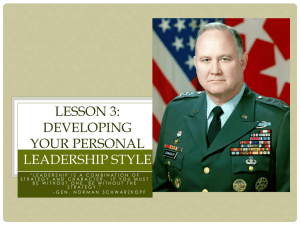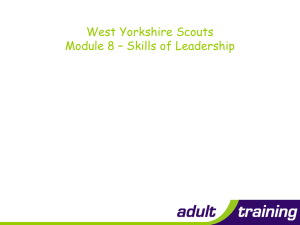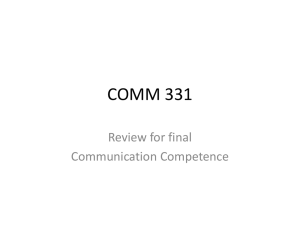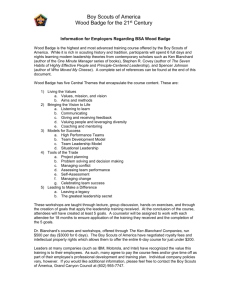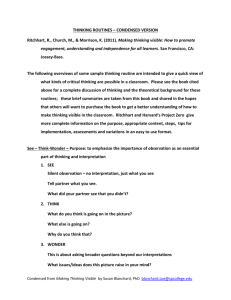My Book Report - Ivy Tech -
advertisement
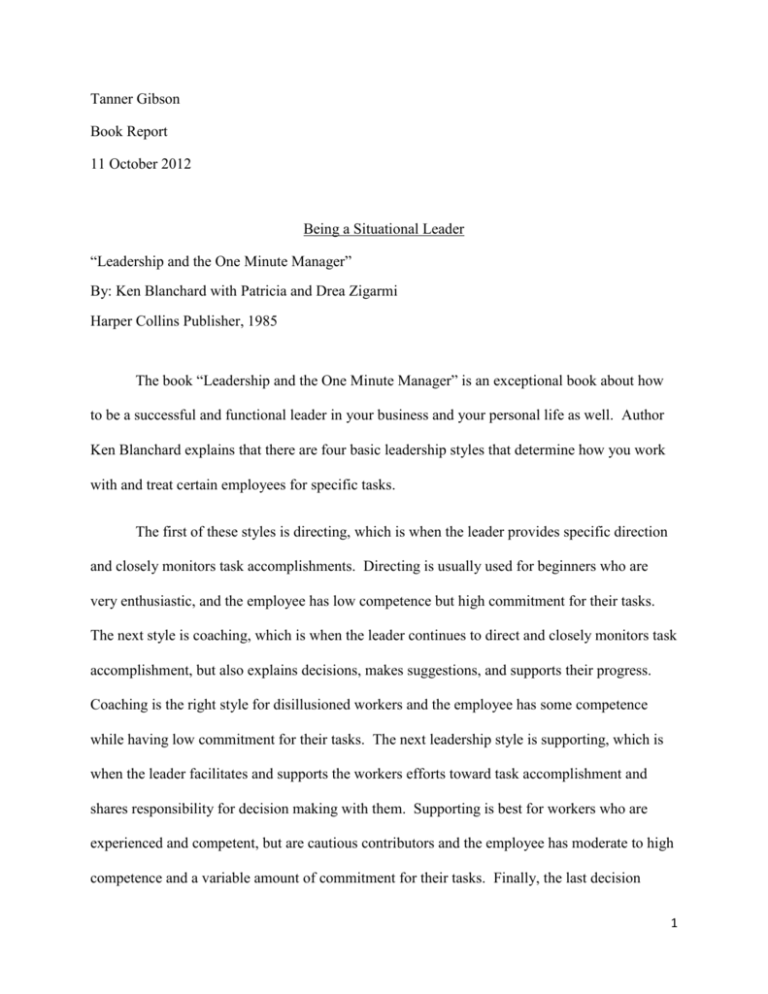
Tanner Gibson Book Report 11 October 2012 Being a Situational Leader “Leadership and the One Minute Manager” By: Ken Blanchard with Patricia and Drea Zigarmi Harper Collins Publisher, 1985 The book “Leadership and the One Minute Manager” is an exceptional book about how to be a successful and functional leader in your business and your personal life as well. Author Ken Blanchard explains that there are four basic leadership styles that determine how you work with and treat certain employees for specific tasks. The first of these styles is directing, which is when the leader provides specific direction and closely monitors task accomplishments. Directing is usually used for beginners who are very enthusiastic, and the employee has low competence but high commitment for their tasks. The next style is coaching, which is when the leader continues to direct and closely monitors task accomplishment, but also explains decisions, makes suggestions, and supports their progress. Coaching is the right style for disillusioned workers and the employee has some competence while having low commitment for their tasks. The next leadership style is supporting, which is when the leader facilitates and supports the workers efforts toward task accomplishment and shares responsibility for decision making with them. Supporting is best for workers who are experienced and competent, but are cautious contributors and the employee has moderate to high competence and a variable amount of commitment for their tasks. Finally, the last decision 1 making style is delegating. Delegating is when the leader turns over responsibilities for decision making and problem solving to the employee. Delegating is best for people who are self-reliant achievers and the employee has high competence and high commitment for their tasks. One of the main reasons that I chose this topic is that I am the oldest in my family, and I am looked at as more of a leader to my family. I figured if I read a book about leadership I can be a better leader and mentor to my younger siblings. Also, my parents own a business. After reading this book, I believe I can now help them become even better business people and better leaders of their business with some advice and tips from “Leadership and the One Minute Manager”. “Leadership and the One Minute Manager” relates to a few circumstances that I have encountered during my few years in the workforce. Some situations I have run into are when my manager does not know how to be a good leader and keep employee morale and commitment up to par. In the book, Blanchard claims that you should treat employees differently in every situation, and I completely agree. The reason why is that one time while I was on the job I was loading a trailer, something that I know how to do very well and I do not need any directing or coaching on how to do the job. However, when I was told to put a billboard sign up, which I have no skills or knowledge of that job, they just let me go on my own and I could not complete the task, then my manager got upset with me. I learned from this book that instead of just assuming that your employee is good at one certain task he is not good at every task and often times needs more directing and coaching on how to properly complete a task. Another experience I am currently going through is when I work for my father at our family business. We have a gymnastics gym and every time there is a meet or an event it is my 2 job to clear the equipment out of the gym and then put it all back together when the event has concluded. When we first started doing this he was directing. He would be there the entire time to help me and my crew members finish the job. The next time we had to do it he was coaching, he would just be there to get a major problem fixed, but asked my opinion on what we should do. Then, he was supporting when he made me make the decisions while he was there, but doing other tasks. Finally, he was delegating since he is now letting me put the equipment away without him even being at the facility. In the ORGB textbook, there is one section in Chapter 12 Leadership and Followership, which talks about being a situational leader (p. 201). The book actually uses Ken Blanchard and Paul Hersey’s four leadership styles. Their four styles are telling, selling, participating, and delegating. The four styles that they describe in the book are the same exact four styles that are in the book, just with a different name for each. The telling and directing styles are the same, the selling and coaching styles are the same, the participating and supporting styles are the same, and the delegating style is named in both. Also, the definitions in the textbook and Blanchard’s book are identical to each other just with a couple of word variations. All in all, I would highly recommend “Leadership and the One Minute Manager” to anyone who thrives to be a better and more effective leader. Blanchard clearly and easily explains each of the four leadership styles with many examples of each and many different views on doing the same style with different situations. He also adds graphs on some pages so that you can see how attitudes and skills determine the different level of leadership you should use. By using the advice from “Leadership and the One Minute Manager,” one can become an effective leader and a better businessman. 3 References Blanchard, Ken. (1985). Leadership and the One Minute Manager. New York: Harper Collins Publishers. Nelson, Debra. Quick, James. (2011). The Situational Leadership Model. ORGB3. p 201. 4



